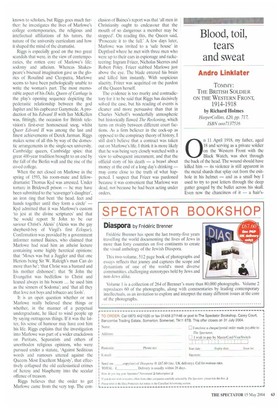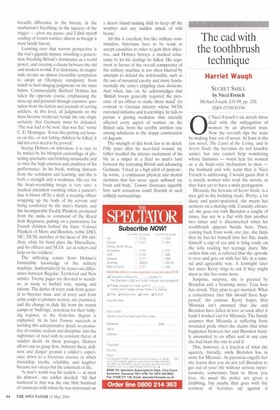Blood, toil, tears and sweat
Andro Linklater
TOMMY:
THE BRITISH SOLDIER ON THE WESTERN FRONT,
1914-1918
by Richard Holmes HarperCollins, £20, pp, 717 ISBN 000 7137516 On11 April 1918, my father, aged 18 and serving as a private soldier on the Western Front with the Black Watch, was shot through the back of the head. The wound should have killed him — its violence is still apparent in the metal shards that splay out from the exithole in his helmet — and as a small boy I used to try to post letters through the deep gutter gouged by the bullet across his skull. Even now the chanciness of it — a hair's
breadth difference in the breeze, in the marksman's breathing, in the squeeze of the trigger — gives me pause, and I find myself reading of trench warfare almost as though it were family history.
Looming over that narrow perspective is the war's gigantic impact, smashing a generation, breaking Britain's dominance as a world power, and creating a chasm between the old and modern worlds. For historians, its magnitude creates an almost irresistible temptation to adopt an Olympian standpoint, from which to hurl stinging judgments on the mess below. Commendably Richard Holmes has taken the opposite course, emphasising the close-up and personal through extensive quotation from the letters and journals of serving soldiers. At this level, all judgments on the mess became irrelevant beside the one single certainty that Germany must be defeated. 'The war had to be won: that was flat,' wrote C. E. Montague. 'It was like putting out houses on fire, or not letting children be killed; it did not even need to be proved.'
Seeing Holmes on television, it is easy to be misled by his blimpish camouflage of glistening spectacles and bristling moustache and so miss the high emotion and erudition of his performance. In his book, nothing distracts from the sentiment and learning, and this is both a strength and a weakness. His eye for the heart-wrenching image is very sure: a medical attendant vomiting when a patient's face is blown off by a shell; a weeping officer wrapping up the body of his servant and being comforted by the man's friends; and the incomparable Freddy Plunkett, promoted from the ranks to command of the Royal Irish Regiment, putting on a pantomime for French children behind the lines: 'Colonel Plunkett of Mons and Bourlon. treble DSO, MC, DCM, marches at the head of 300 children, while his band plays the Marseillaise, and his officers and NCOs act as ushers and help on the toddlers.'
The stiffening comes from Holmes's formidable knowledge of the military machine. Authoritatively he teases out differences between Regular, Territorial and New armies. Twenty pages are devoted to trenches, as many to barbed wire, mining and rations. The duties of every rank from general to bayonet man, and of every unit from army corps to pioneer section, are examined, and the change in daily life from the transit camps or 'bullrings', notorious for their bullying regimes, to the front-line dugout is explained. At its best Tommy succeeds in melding this administrative detail, so productive of routine, tedium and discipline, into the nightmare of mud with its constant threat of sudden death. In those passages, Holmes allows one to grasp how, between them, dullness and danger ground a soldier's experience down to a ferocious essence in which friendship, loyalty, reliability, and laughter became not virtues but the essentials of life.
'A man's world was his section — at most his platoon', one soldier decided. 'All that mattered to him was the one little boatload of castaways with whom he was marooned on a desert island making shift to keep off the weather and any sudden attack of wild beasts.'
All this is excellent, but like military commanders, historians have to be ready to accept casualties in order to gain their objective, and Holmes betrays a marked reluctance to let his darlings be killed. His argument in favour of the overall competence of the military machine is too often blurred by attempts to defend the indefensible, such as the use of mounted cavalry and more fundamentally the army's crippling class divisions. And when, late on, he acknowledges that 'British troops generally required the presence of an officer to make them stand' (in contrast to German infantry whose NCOs exercised initiative and leadership), he fails to pursue a glaring weakness that crucially affected every aspect of warfare on the British side, from the terrible attrition rate among subalterns to the sloppy construction of dugouts.
The strength of this book lies in its detail. Fifty years after his near-fatal wound, my father recalled the intense excitement of his life as a sniper in a fluid no man's land between the retreating British and advancing Germans. 'I lived at a high pitch of purpose', he wrote, 'a continuous physical and mental alertness that has never again suffused my brain and body.' Tommy illustrates superbly how such sensations could flourish in such unlikely surroundings.



































































































 Previous page
Previous page